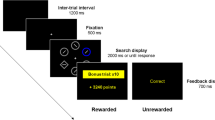Abstract
Evidence in the research literature indicates people may treat “won” money differently than they would their own money. The present study had a sample of 648 college students complete a delay-discounting task that involved the hypothetical monetary amounts of $1,000 or $100,000. Participants were asked repeatedly what amount they would accept immediately rather than waiting a given length of time for the full amount. One group was told these amounts were money they had won; the other group was told that the amounts were money they were owed. Results showed participants discounted money “won” more than money “owed,” indicating that won money was less valued than their own money. These results suggest that researchers who study discounting should be aware that contextual factors may play a role in delay discounting.
Similar content being viewed by others
References
ACKERT, L. F., CHARUPAT, N., CHURCH, B. K., & DEAVES, R. (2006). An experimental examination of the house money effect in a multi-period setting. Experimental Economics, 9, 5–16.
BAKER, F., JOHNSON, M. W., & BICKEL, W. K. (2003). Decision-making in state lotteries: Half now or all of it later? Psychonomic Bulletin & Review, 10, 965–970.
COHEN, J. (1988). Statistical power analysis for the behavioral sciences (2nd ed.). Hillsdale, NJ: erlbaum.
DIXON, M. R., MARLEY, J., & JACOBS, E. A. (2003). Delay discounting by pathologicalgamblers. Journal of Applied Behavior Analysis, 36, 449–458.
FRINO, A., GRANT, J., & JOHNSTONE, D. (2008). The house money effect and local traders on the Sydney Futures exchange. Pacific Basin Finance Journal, 16, 8–25.
HARDISTY, D. J., & WEBER, E. U. (2009). Discounting future green: Money versus the environment. Journal of Experimental Psychology: General, 138, 329–340.
KAHNEMAN, D., KNETSCH, J. L., & THALER, R. H. (1990). Experimental tests of the endowment effect and the Coase theorem. Journal of Political Economy, 98, 1325–1348.
KANTOR, J. R. & SMITH, N. W. (1975). The science of psychology: An interbehavioral survey. Chicago: Principia Press.
KAWASHIMA, K. (2006). The effects of inflation and interest rates on delay discounting in human behavior. The Psychological Record, 56, 551–568.
KEASEY, K., & MOON, P. (1996). Gambling with the house money in capital expenditure decisions: An experimental analysis. Economic Letters, 50, 105–110.
Lik, N. M. K., Dixon, M. R., Green, L., & Myerson, J. Delay discounting of hypothetical and real money: The effect of holding reinforcement rate constant. Manuscript submitted for publication.
MADDEN, G. J., BEGOTKA, A. M., RAIFF, B. R., & KASTERN, L. L. (2003). Delay discounting real and hypothetical rewards. Experimental and Clinical Psychopharmacology, 11, 139–145.
MAZUR, J. E. (1987). An adjusting procedure for studying delayed reinforcement. In M. L. COMMONS, J. E. MAZUR, J. A. NEVIN, & H. RACHLIN (eds.)? Quantitative analyses of behavior: The effect of delay and intervening events on reinforcement value (vol. 5, pp. 55–73). Hillsdale, NJ: erlbaum.
MICHAEL, J. (1993). Establishing operations. The Behavior Analyst, 16, 191–206.
MOREWEDGE, C. K., SHU, L. L., GILBERT, D. T., & WILSON, T. D. (2009). Bad riddance or good rubbish? Ownership and not loss aversion causes the endowment effect. Journal of Experimental Social Psychology, 45, 947–951.
MYERSON, J., GREEN, L., & WARUSAWITHARANA, M. (2001). Area under the curve as a measure of discounting. Journal of the Experimental Analysis of behavior, 76, 235–243.
PETRY, N. M. (2005). Pathological gambling: Etiology, comorbidity, and treatment. Washington, DC: American Psychological Association.
SMITH, C. L., & HANTULA, D. A. (2008). Methodological considerations in the study of delay discounting in intertemporal choice: A comparison of tasks and modes. Behavior Research Methods, 40, 940–953.
TAKAHASHI, M., MASATAKA, N., MALAIVIJITNOND, S., & WONGSIRI, S. (2008). Future rice is discounted less steeply than future money in Thailand. The Psychological Record, 58, 175–190.
THALER, R. (1981). Some empiricial evidence on dynamic inconsistency. Economics Letters, 8, 201–207.
WEATHERLY, J. N., & BRANDT, A. E. (2004). Participants’ sensitivity to percentage payback and credit value when playing a slot-machine simulation. Behavior and Social Issues, 13, 33–50.
WEATHERLY, J. N., DERENNE, A., & CHASE, S. (2008). Do the risk factors for pathological gambling predict temporal discounting? Analysis of Gambling behavior, 2, 25–34.
WEATHERLY, J. N., MARINO, J. M., FERRARO, F. R., & SLAGLE, B. (2008). Temporal discounting predicts how people gamble on a slot machine. Analysis of Gambling Behavior, 2, 135–141.
WEATHERLY, J. N., & MEIER, E. (2007). Studying gambling experimentally: The value of money. Analysis of Gambling Behavior, 1, 133–140.
WHELAN, R., & MCHUGH, L. A. (2009). Temporal discounting of hypothetical monetary rewards by adolescents, adults, and older adults. The Psychological Record, 59, 247–258.
YI, R., MITCHELL, S. H., & BICKEL, W. K. (2010). Delay discounting and substance abuse-dependence. In G. J. MADDEN & W. K. BICKEL (eds.)? Impulsivity: The behavioral and neurological science of discounting (pp. 191–211). Washington, DC: American Psychological Association.
Author information
Authors and Affiliations
Corresponding author
Rights and permissions
About this article
Cite this article
Weatherly, J.N., Derenne, A. & Terrell, H.K. College Students Discount Money “Won” More than Money “Owed”. Psychol Rec 60, 463–471 (2010). https://doi.org/10.1007/BF03395721
Published:
Issue Date:
DOI: https://doi.org/10.1007/BF03395721




